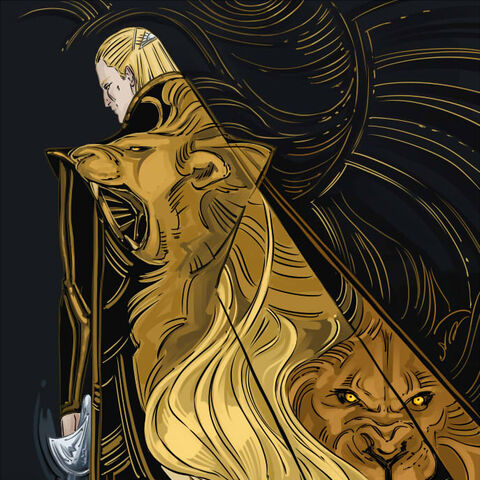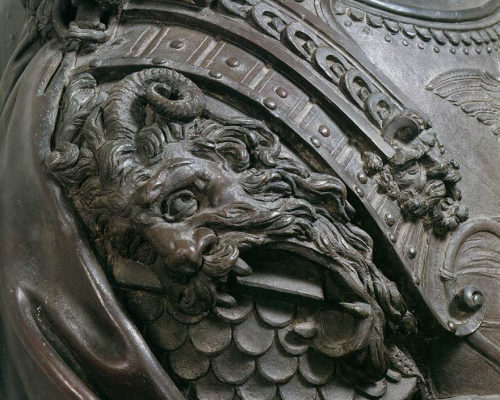Who is more noble in the grand scheme of life, he who is incapable of violence, or he who is capable, but abstains? If you are too weak to do harm, is your abstention from it attributable to the goodness within you?
How many times have you heard the phrase “The meek shall inherit the Earth”? More often than not, the phrase is misunderstood by those who use it. In its modern usage, it’s designed as some sort of chastisement against men of action, masculinity, and those who dare. Stemming from Jesus’ Sermon on the Mount, many have since taken the meaning of the word ‘meek’ to indicate the weak, or otherwise frail, and that the Earth is due to them as some sort of compensation for their trials and tribulations of our current age. Now, the phrase is a celebration of weakness, cowardice, and submission.
In reality, the word meek does not reflect the true intent or definition that it once did. From the original Greek translation, praus was not a word referring to the weak, but instead referred to one who expressed control or power without undue harshness. In the original Greek, the broken horse was referred to as the original praus. This mass of bone and muscle was controlled by light pressure from the knee, or a twist of a bridle, and was not weak, it was control. Meekness is, at its true root, control over power.
The history of our intellectual-class and the modern usage of the phrase, time and time again, reveals how useful the lie of meekness has been to those who still espouse it. Jordan Peterson, despite his controversial views on other topics, was right in pointing this out. In Jordan Peterson’s explanation, meek referred to a man with a sword and the training to use it when needed. Chögyam Trungpa expounded upon meekness further in his book Shambhala, describing that meekness is one of the essential faces of the warrior, “The warrior of meek: kind and mercy to others.”
In all cases, control is the root of meekness, not weakness. A strong man who is capable of violence and knows the power of his own hands, but sheathes his weapons when they are not needed, is in control of himself. Nietzsche himself commented that most cowards are moral, not because they are moral at their root, but because they use it as a disguise to hide their weakness. Therefore, their benevolence is less a product of their moral integrity, but their inability to harm in the first place. The blessed meek in the Sermon on the Mount were not flabby soyboys crying about chads taking their women or a poltroon justifying that he’ll “be the bigger man” when he should be defending his woman against slander. Meekness is control, not wimpish inaction.
Weak people are rightly lower in naturally ordered hierarchies, especially when they have no other redeemable qualities to raise their status. Claiming that “The meek shall inherit the Earth” is merely the peacocks tail for these frail creatures who cannot compare to the hawks or eagles above them. This is not to say that strength is the only value, or that the mighty should rule, but you must have some sort of strength or value. Strength is not limited to the physical. We often see that idiots are the first to flap their gums about topics in which they believe they’ve learned. Meanwhile, real experts are controlled and measured when they reveal the depths of their understanding. Control is a value on parity with strength and intelligence.
Cultivate strength and control in everything you do. And, become someone who deserves their inheritance due to the blessed meek.

We are witnessing, not the natural end of a great human civilization, but the birth of an inhuman civilization that could never have come into being without a vast, an immense, a universal sterilization of life’s highest values






I agree with you overall argument that meek translates to control of power. Your conclusion appears to reject your overall argument. You write: ‘Claiming that “The meek shall inherit the Earth” is merely the peacocks tail for these frail creatures who cannot compare to the hawks or eagles above them.’ In fact, when men control their power they do “inherit” status and subsequently wealth.
A fantastic reminder of the Christian man’s command, by God, to rein over Creation. That command demands control over power. And with the introduction of sin, and evil now existing on the earth, we brothers MUST prayerfully seek to glorify God through the application of strength He has given us.
Excellent post!
“original Greek, the broken horse was referred to as the original praus. This mass of bone and muscle was controlled by light pressure from the knee, or a twist of a bridle, and was not weak, it was control.”
“In all cases, control is the root of meekness, not weakness.”
Yeah, so be meek like a broken horse. Tame and submissive. Fuggin retard level post.
From Websters 1828 American Dictionary of the English Language:
In other words, self control or self restraint. Self-government (one of the fundamental Southron values), in a word.
All of which is severely lacking in your retard level post, Mr. “See Ya”. Now begone, child.
Knowing when, where, and how to exert your power is the truest test of a man. This article has nothing to do with being “meek like a broken horse” but it debunks the idea that meek means weak. Having the power to crush skulls and applying that power only when required is meekness.
Well, it has something to do with “being meek like a broken horse.” The broken horse is still powerful, courageous and brave in battle; all of which characteristics are just properly restrained, controlled, directed, by the rider. Where Mr. See Ya goes off the rails is when he asserts that properly restraining the power and courage of the horse means the horse has become weak and powerless. Don’t worry with it: he’s a moron, and morons don’t inherit the earth. That’s it, that’s all.
He used the definition to make his point, his point doesn’t stand.
Jesus was a beggar preaching to the dregs of society. You think they had the power to crush skulls? Lol.
His point stands well enough, dipshit. That you are incapable of understanding it for whatever reason (maybe you don’t understand horses, or the virtue of breaking horses in pursuit of the greater good they might serve, but whatever) is irrelevant here. Like I said before, begone. Your “insights” are totally useless here, and no one with any common sense or knowledge of horses per se cares to read them in any case.
A beggar?
52 Then said Jesus unto him, Put up again thy sword into his place: for all they that take the sword shall perish with the sword.
53 Thinkest thou that I cannot now pray to my Father, and he shall presently give me more than twelve legions of angels?
You better hope your right, or you going to have some explaining to do.
I don’t understand why you posted these verses. How are they relevant?
The big problem is the abuse of poor translation to warp the message has left a long legacy of stupid. It is a valorization of dependence that breaks sane incentive structures. In the present context it is most visible in British and New England Yankee reformers derping about the dignity of all persons for their simply being alive. This is a stark contrast to the sane position held in every functional society since antiquity that the high are high and the low are low for reasons.
It matters little how smart, kind, or popular a man is if they handicap themselves by chaining themselves to stupidities however “common sense” the stupidities may be. There is a dark continent full of matriarchical societies where unearned obligations to one’s supposedly “beloved” produce a perpetual crab bucketing failure that inevitably leads to famine and slaughter when the occasional active man disregards the wail. Western Europe and Britain started culturally Africanizing well before they started bodies that just happened to come from there.
Anyways, it is important not to let failed Yankee culture in through the backdoor simply because they’ve loaded up beloved parts of the culture with their ideology of failure.
Errrgh! We’re on the same side and all of that, but please always keep in mind that “a man” is not, in point of fact, a “they” or a “themselves.” He is a “he,” or a “himself.” He is, in point of fact, A MAN.
I personally don’t care about NAZIs, btw, keyboard types or otherwise; my point here is that you ought to care about being correct and consistent in your writing. Always! At the end of the day it is one way (among many) in which we’ll make the idiots who stupidly oppose us out to be the idiots that they are. Buying into and emulating their style of (genderless) writing is a huge mistake on our parts. So let’s stop that, now, please!
I will try to work on it.
Self-control and self-restraint are admirable traits. Making this point by citing the sermon on the mount????? Where I stay on the rails, I remember that the noble, courageous, powerful horse is still a beast of burden. Tame and submissive, is he.
People have a funny way of twisting scripture to suit their needs. Nevermind that the sermon on the mount was written nearly a century after Christ was killed. Written by a(n) anonymous jew(s).
A guy who caches hurt feelings from an internet comment and starts flinging insults… super self-controlled, right there
Well, I’ll just remind you, since you seem to have forgotten already, that it was in fact you who flung the first insult, referring to the article as a “fuggin retard level post.” I’ll also inform you that I’m not especially in the habit of mincing words; that if you or anyone else makes those kinds of dumbass comments insulting the contributors here, I’m very likely to come to their defense if and when I read them, and also to speak in a style of language that I know you’ll understand, or that at least will get your attention. But if you think any of it emanates from what you call “hurt feelings,” you’re actually dumber’n I thought to begin with.
Bottom line: don’t say stupid shit or insult the contributors here and I won’t call you on it. Comprehende?
Self-control and self-restraint are admirable traits. Making this point by citing the sermon on the mount????? Where I stay on the rails, I remember that the noble, courageous, powerful horse is still a beast of burden. Tame and submissive, is he.
People have a funny way of twisting scripture to suit their needs. Nevermind that the sermon on the mount was written nearly a century after Christ was killed. Written by a(n) anonymous jew(s).
A guy who caches hurt feelings from an internet comment and starts flinging insults… super self-controlled, right there
Comments getting deleted?
I don’t see one in the deleted folder.
Correction, a couple were flagged as spam. I restored them.
Broken horses can and will throw abusive riders, or scrape them off using low hanging branches over a fence. The relationship is one of mutual respect and co-operation so that horse and rider become one. It’s not about using force to make the horse do something the horse does not want to do, try that and you’ll wind up flat on your ass in the paddock.
One of my dear friends , my pastor for years , was a meek man . Gentle, composed, a giant that could break most men in half and not break a sweat. When I think of meek, I always think of him.
This post is a good reminder, thanks.
Rajput Rifles motto translates to The Brave shall inherit the Earth.
Even Hindus less gay than christcucks. 🤷♀️
Somebody said this about the “sheepdog” meme.
“Have a capacity for violence, and a deep love for your fellow citizens.”
Personally, I never liked the sheepdog reference connotation, because the sheepdog guards the sheep up until the flock owner decides it’s slaughter time.
But, I think the quote is golden.
Great article.Its so interesting how men will fight and kill when corrupt governments tell them to(albeit with powerful inducements)but rarely do so for a cause that actually benefits them.We cannot be violent be nature yet not passive.So your point makes great sense.
That should have read”We cannot be violent by nature yet also not passive”.